| Srl | Item |
| 1 |
ID:
123079
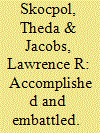

|
|
|
|
|
| Publication |
2012.
|
| Summary/Abstract |
THEDA SKOCPOL and LAWRENCE R. JACOBS assess the policy accomplishments and shortfalls of President Barack Obama since 2009. They highlight the obstacles with which Obama and his political allies have had to contend and challenge commentators who claim that Obama has accomplished little. They explain why conservative and Republican opposition to Obama's presidency has been fierce and unremitting.
|
|
|
|
|
|
|
|
|
|
|
|
|
|
|
|
| 2 |
ID:
100789
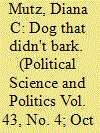

|
|
|
|
|
| Publication |
2010.
|
| Summary/Abstract |
Using the most extensive dataset available on the 2008 election, I examine the impact of dog ownership on presidential vote preference. Canines were elevated to the status of a campaign issue when, during the 2008 campaign, Barack Obama publicly promised his daughters a dog after the election was over, a campaign promise that has since been fulfilled. However, this announcement appears to have unintentionally highlighted the absence of a key point of potential identification between this candidate and voters, and thus to have significantly undermined the likelihood that dog-owning voters would support Obama. I elaborate upon the implications of this finding for future presidential candidates.
|
|
|
|
|
|
|
|
|
|
|
|
|
|
|
|
| 3 |
ID:
121412
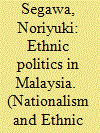

|
|
|
|
|
| Publication |
2013.
|
| Summary/Abstract |
This article examines the direction of ethnic politics in Malaysia by investigating the 2008 election results and the subsequent political maneuverings of political parties following the election. The results do not clearly demonstrate the demise of ethnic politics; however, the communal political paradigm of the Barisan Nasional Party (BN) has become increasingly ineffective in its attempts to appease both Malay and non-Malay communities. Following the election, the BN seems to have moved towards the adoption of a multiethnic agenda, whereas its affiliated parties have chosen to maintain their communal political paradigm. Furthermore, the Pakatan Rakyat has not outlined a clear multiethnic platform and has failed to reject communal politics. The Malaysian political paradigm has yet to shift qualitatively away from ethnic politics.
|
|
|
|
|
|
|
|
|
|
|
|
|
|
|
|
| 4 |
ID:
096047
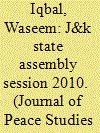

|
|
|
| 5 |
ID:
129285


|
|
|
| 6 |
ID:
116470


|
|
|
|
|
| Publication |
2012.
|
| Summary/Abstract |
In the wake of the 2008 election, disgruntled conservatives organized opposition to President Obama's policies under a new movement dubbed the Tea Party. As an emerging force in American politics, we seek to understand who supports the Tea Party and the political attitudes these individuals hold. Using a nationally representative survey of respondents during the 2010 midterm elections, we examine whether the emerging narrative surrounding the Tea Party is accurate. The survey included a novel embedded experiment designed to investigate claims that animosity toward racial minorities drives Tea Party opposition to welfare. We find support for the contention that the Tea Party is predominately white, male, conservative, and strongly opposed to tax increases. Tea Party supporters, however, are not simply libertarians. In spite of appeals to freedom and liberty common in Tea Party rhetoric, a strong authoritarian pulse exists among its most ardent supporters. Furthermore, although we find evidence that racial resentment colors Tea Party members' judgments about government aid to the poor, racial animus does not appear to be the primary force behind their opposition to government aid. Lastly, we uncover some evidence of heterogeneity within the movement, with a small minority of Tea Party supporters voicing less-extreme political attitudes and evincing a rejection of negative racial stereotypes.
|
|
|
|
|
|
|
|
|
|
|
|
|
|
|
|
| 7 |
ID:
098116
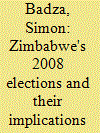

|
|
|